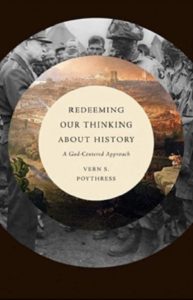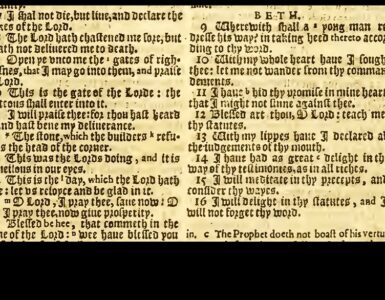 Even though it was said over a hundred years ago, the following comment by an important American industrialist would find many sympathizers today.
Even though it was said over a hundred years ago, the following comment by an important American industrialist would find many sympathizers today.
History is more or less bunk. It’s tradition. We don’t want tradition. We want to live in the present and the only history that matters is the history we make today (see notes).
Right now is all that counts. The past is the past. Traditions are not good. Vern Poythress’s Redeeming Our Thinking About History: A God Centered Approach, Crossway, 2022, presents his case to a society skeptical regarding history in general and cynical about the truth of any fact. In the wake of postmodernism current views of a variety of subjects are sometimes developed with assistance of caricatures of past people, movements, and events based on selective use of information as proponents dive into what they believe is the bunk bin of history. Information used is then returned from whence it came. In this history-challenged era, how does the author make a case for studying history? On his side are earned doctorates in both mathematics and theology (an uncommon combination) that provide a broad foundation for fulfillment of his teaching calling for over forty years at Westminster Theological Seminary in Philadelphia. Though a seminary professor, the book is not only about church history as might be expected, but is instead about understanding and doing history generally with church history included.
The cover pictured shows the general history emphasis of the book with a circular snippet of Dwight D. Eisenhower greeting a soldier during World War 2. Within the book Dr. Poythress provides five sections that answer four key questions: Is history important? Should it be important to Christians? What is a Christian view of History? and How should Christians study and write about history? (p. 11) The text is written with a general readership in mind and when more discipline specific terminology is used, it is defined. The author effectively uses questions throughout the book to focus readers’ attention on key issues as he goes on to provide extended answers. The chapters are not too long, which facilitates reading the book while waiting for appointments or sitting behind the wheel anticipating scholars in school carlines. Included are a bibliography as well as general and Bible reference indexes.
Essential for the author is the concept of antithesis (pp. 43-49). Antithesis is fundamental for Redeeming Our Thinking About History as well as for the author’s other Redeeming titles that address the subjects of philosophy, mathematics, sociology, and science. Antithesis is not a term of complex jargon but instead expresses simply the difference between Christians and non-Christians. Because of the fall into sin in Eden, all individuals are either members of God’s kingdom through the grace of God, or they are not. There is no middle ground; the positions of belief and unbelief oppose each other, thus they stand in antithesis. When one is a Christian whether growing up as a covenant child knowing Christ, or as one who comes to the gospel at a latter time of life, included is renewal of the mind. As John Calvin expressed it often in his writings, the gospel provides spectacles with which the Christian can see the world rightly. The spectacles of sanctification provide continuously adjusted refraction for the Christian surveying the panorama of God’s creation bringing all aspects into focus as the Word is read and understanding is illumined by the Holy Spirit. The author encourages Christians to put before their spectacled eyes history for reading, understanding, and assimilating for better comprehension of the present and future. History is particularly important for Christians because they are beneficiaries of the history of redemption not only in the past with the atoning sacrifice of Christ on the cross, but also looking to the future and the glorious fulfillment of the Kingdom of God.
Anyone that would like to know how to think Christianly about history would benefit greatly from reading Dr. Poythress’s Redeeming Our Thinking About History. The book will help readers consider seriously the importance of history in general, how to do it as a Christian, and the benefits of reading it rightly. If Henry Ford, the industrialist mentioned at the beginning of this review, had taken history seriously he may have learned that those who do not progress technologically may very well lose their market share. Mr. Ford was averse to making changes to the Model T, so much so that his unwillingness to replace mechanically actuated brakes with hydraulic ones allowed Chevrolet to rise to first place in auto sales.
Could there be a book in the works titled, Redeeming Our Thinking About Politics?
Barry Waugh
Notes—The copy of Redeeming Our Thinking About History used for this review was provided by the publisher, Crossway. The header image is from Pixabay and was located using the search “bookshelf.” The quote is from Henry Ford (1863-1947) and is edited from the original as published in the Chicago Tribune, May 25, 1916.





